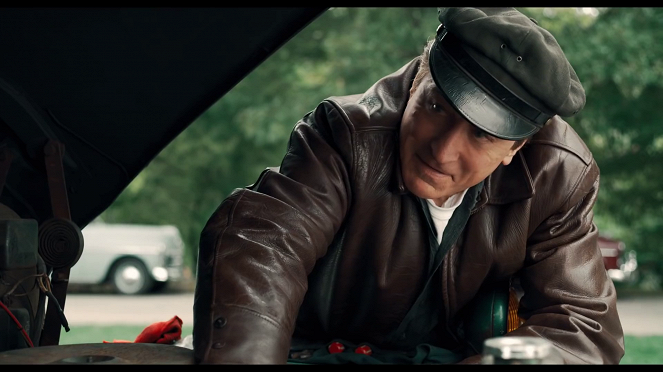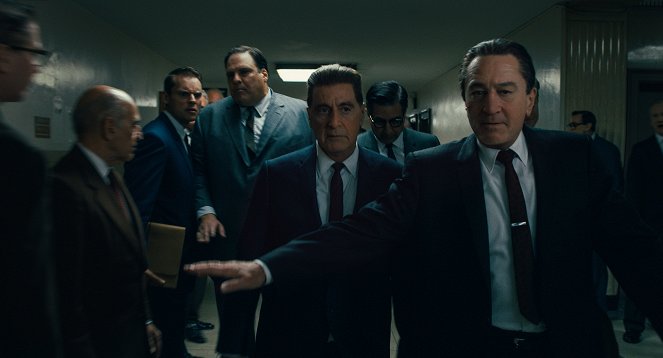Directed by:
Martin ScorseseScreenplay:
Steven ZaillianCinematography:
Rodrigo PrietoComposer:
Robbie RobertsonCast:
Robert De Niro, Al Pacino, Joe Pesci, Bobby Cannavale, Harvey Keitel, Ray Romano, Stephen Graham, Anna Paquin, Stephanie Kurtzuba, Jack Huston (more)VOD (1)
Plots(1)
Martin Scorsese’s cinematic mastery is on full display in this sweeping crime saga, which serves as an elegiac summation of his six-decade career. Left behind by the world, former hit man and union truck driver Frank Sheeran (Robert De Niro) looks back from a nursing home on his life’s journey through the ranks of organized crime: from his involvement with Philadelphia mob boss Russell Bufalino (Joe Pesci) to his association with Teamsters union head Jimmy Hoffa (Al Pacino) to the rift that forced him to choose between the two. An intimate story of loyalty and betrayal writ large across the epic canvas of mid-twentieth-century American history, The Irishman (based on the real-life Sheeran’s confessions, as told to writer Charles Brandt for the book I Heard You Paint Houses) is a uniquely reflective late-career triumph that balances its director’s virtuoso set pieces with a profoundly personal rumination on aging, mortality, and the decisions and regrets that shape a life. (Criterion)
(more)Videos (7)
Reviews (16)
A modern classic? It’s more of a you-wish gesture masterfully timed for the period when Scorsese stirred up a totally anachronistic debate about high and low. The film itself relies on the use of technologies that have been largely brought forth by Disney (Tron 2) and Marvel, and on the robust plan of Zailian's screenplay, which again lavishly beats around the bush, but does not work much with the depth of the characters. De Niro's Sheeran is therefore a static and slowly shifting cruel mountain of CGI flesh, and his picaresque pilgrimage through the history of American trade union-mafia intercourse drags on like an old man. The characters who are age thirty move about like they are eighty and in some ways, this accurately captures the essence of Scorsese's work - this stocky, corrugated professorship that lacks elegance and fun segments, but as a whole functions more like a cinephile fetish and an obelisk worshiping the past. At the same time, however, it fits very well into Netflix's portfolio, where the absence of a strict dramaturgy is confused with a robust creative vision. Martin is too good a director to make a disguised film, but his firm The Irishman is as stimulating as De Niro's face when he fires lead into German prisoners in a miserable, unintentional paraphrase of Call of Duty. For me, it’s on the thin edge of cringe.
()
The topic of disputes between trade unions and the government in America of the 1970s is not exactly my cup of tea. However, the pace of the narrative and the eye-catching depiction of the mafia world make The Irishman almost as good as Goodfellas. Moreover, we find ourselves at a much higher level here, among the uppermost ranks of the American mafia of that period. De Niro has the hardest task with an artificially young face with old eyes; it takes some time to get used to the digitalization in the first half of the film. He plays the killer in the traditional way, as we are used to from his similar roles. Pacino is more original, as his portrayal of Hoffa is eccentric, with political enthusiasm, great pride and the morally purest intentions of the whole bunch. He delivers the most striking acting performance of the film. For me, however, the biggest pleasure was watching Pesci, the man behind the curtain deciding who lives and who dies. He has transformed from a knife-wielding apathetic madman (Goodfellas) into a super-powerful player with a talent for mafia chess on whom all sides can rely. He excels in every scene. Keitel gets a minimum of space, but his role is that of one of the most respected bosses of the time. The director adds some of his trademark quirks, which stand out even more on repeat viewing. The top scene, which makes one’s blood run cold, doesn’t have a tense musical background, but is framed by an absurd dialogue about fish. The running time doesn’t seem too long at all, as this “road-movie” is about taking nostalgic pleasure from Marti’s unique style and a legendary constellation of acting performances we won’t ever see again.
()
When, after roughly two hours, The Irishman stops switching between the two narrative lines and three different time planes that together set the film’s rhythm, it becomes clear that the wedding was not actually the primary destination of Frank’s journey. At the same time, one important character from Frank’s past comes into the road-movie framework. Contrary to the custom of accelerating the pace as the end approaches, the film slows down and becomes more focused, no longer engaging in a series of diversions and jumping between numerous people and events. We realise that the memory of a given event is of fundamental importance for Frank and he wants to recount it in as much detail as possible, step by step, minute by minute. Thanks to the context provided by the previous two hours, we concurrently comprehend what this is leading to and what the individual characters are experiencing. We start to understand that Frank had merely been carrying out another one of his missions, which usually ends with a house getting painted. ___ In the first narrative line, Frank is in the final phase of his life, just before his death. In the other, he is heading toward death. It seems that all of the events in his life involve death and dying in some way. The detached approach to killing well demonstrates Scorsese’s departure from the more dynamic style of his earlier mafia films. In The Irishman, violence is not “cool”; sometimes we don’t even see it, we only hear it from a distance. If an upbeat song is playing in the car during one of the murders, that is only because the driver turned on the radio to drown out the death rattle of the strangled victim. ___ Frank's blackened conscience, a reminder of his sins and the incompatibility of violent behaviour with the feeling of having a safe home, is represented by his daughter Peggy, thanks to whom we realise that Frank fills his emotional emptiness with words and diverts attention from his inner self to the outside. Though Frank’s relationship with his daughter may seem to be of secondary importance in the context of a story in which people die, cars explode and mobsters bribe top politicians, it is that relationship which best describes how Frank feels and what he longs for above all else: to go out into the world reconciled with himself and with his loved ones. Despite first appearances, the core of the film thus does not represent Frank’s involvement in the structures of the Italian-American mafia and trade unions, but what he lost due to his career advancement. Civil dialogue and time spent in the family circle appear to be more important than a detailed description of the underworld and a factual depiction of Frank’s work processes. Rather than an epic mafia saga, The Irishman is primarily an intimate drama about dysfunctional relationships and the constant presence of death, the basis of which we always carry within ourselves (as we realise thanks also to digitally rejuvenated acting veterans). 95%
()
Martin Scorsese delivers the ultimate gangster film, letting the legends of the cast shine with rejuvenated faces, but also switching directorial styles in a way he probably could never get away with in the cinema. The Irishman can be fast and riveting, but also slow, talky or surprisingly emotional. Scorsese didn't have to compromise this time, and it's definitely worth seeing what he can deliver when he's given a lot of money, a dream cast and a free hand. Still, it might have been a good idea to have someone at his back to at least tactfully point out the moments when his big film drags a bit.
()
As much as I love gangster movies, I'm not too happy with Irishman. Martin Scorsese returns to the genre that made him famous and assembles together a cast of mafia legends, but he fails to draw me into the plot at all. I enjoyed the first hour, where Robert De Niro gets into the gangster underworld as an assassin, but once Al Pacino showed up, the film stopped being all that interesting. I was disappointed that there were no shootouts and even the few murders looked pretty unnatural. I wasn't too interested in the plot, the dialogue had nothing to engage me, it's not suspenseful or tense either, so I really don't know where to look for plus points. I'd rather watch Scarface again, but at least I didn't suffer like I did with the new Tarantino film. 6/10.
()



Ads